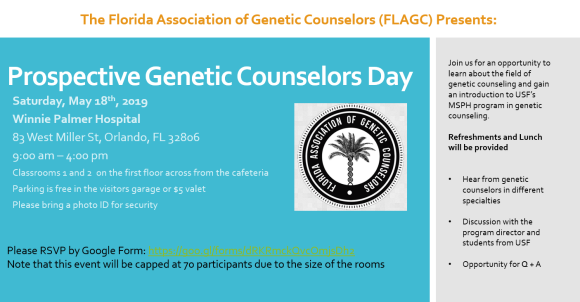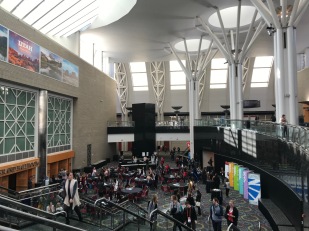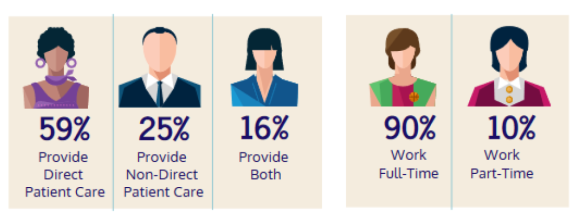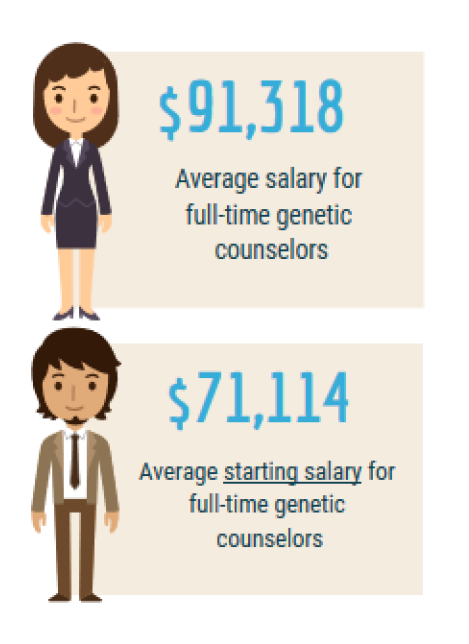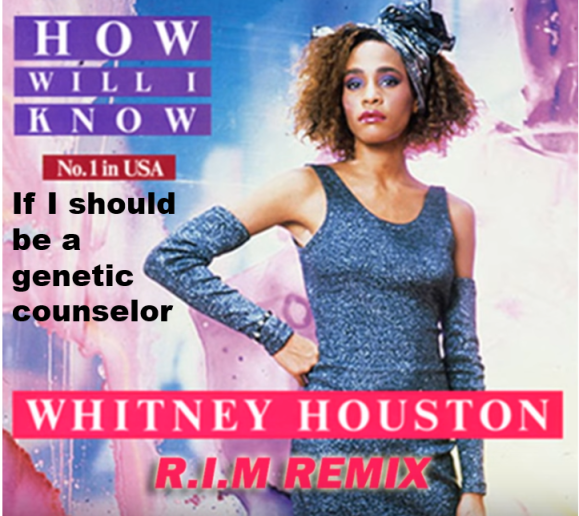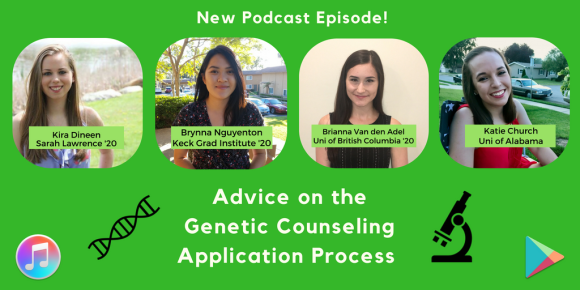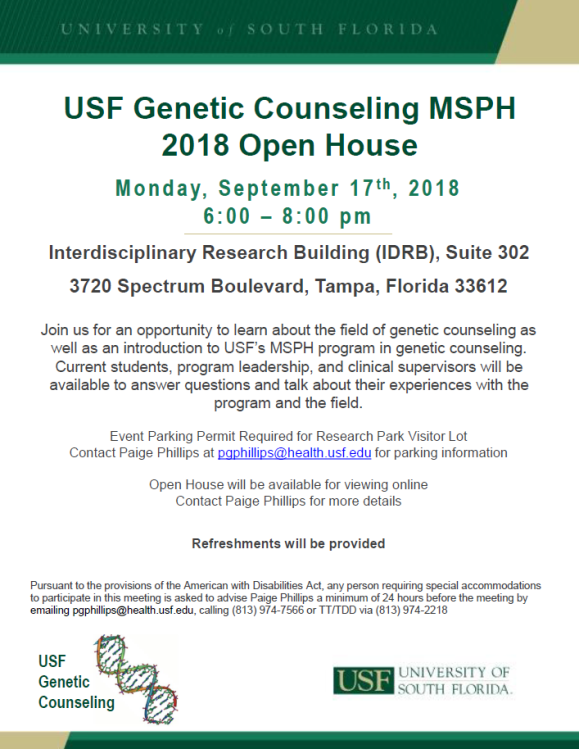After leaving all of our beloved M&G readers on the biggest cliffhanger with our “Life as a Genetic Counseling Assistant (GCA)” segment, I’m happy to announce that Part 2 is here! Below, Lauren describes her experiences working as a GCA and how she assists genetic counselors in a clinical setting.
If you missed Part 1 featuring Lab Genetic Counseling, scroll down to Moriah’s previous post!
As always, join the discussion by leaving a comment below or joining us on Twitter at @mapsandgenes!
**************************
Hello everyone, my name is Lauren Boucher and I am currently a genetic counseling student at Virginia Commonwealth University. I worked as a GCA for Southern Illinois University School of Medicine (SIU) from June 2018-August 2019, and I will be sharing what it was like to work in a clinical setting. To reiterate our goal for these posts, it is our desire to provide a resource for potential applicants and prospective students by discussing what it’s like to hold a GCA position and how it has/will help us as we look forward to joining the Genetic Counseling (GC) community!
Main Duties
When I initially signed my contract with SIU, the only thing my supervisors and I knew about my position was that they had no idea what I would be doing – only that my purpose was to reduce the insane workload of the existing genetics team! It was truly a loosely defined and ever evolving position that resulted in me becoming a jack of all trades. I would divide my job responsibilities as patient communication/education, billing/test coordination, and primary contact for genetic testing laboratories.
Patient communication was, without a doubt, the most important part of my position as a GCA. I am so lucky to have had the opportunity to participate in clinic by shadowing our medical geneticist and genetic counselors. Collecting family histories, interacting with patients during the appointments, collecting medical records, coordinating genetic testing, answering questions, and even being an outlet for anxious parents/patients was the most enjoyable part of my job. This meant that I spent an absurd amount of time on the phone, but hey, that is why Bluetooth headsets exist right?
Next, billing coordination was by far the most surprising responsibility I had as a GCA, mostly due to the sparsely defined position description. Looking back on this now, I would not be surprised at all to be handling billing matters since it is considered within the field to be a task that GCAs commonly perform. After a few weeks of working, my supervisors asked how I would feel about getting more involved with billing and I was absolutely terrified. To preface, I entered this position knowing that insurance pays for some of a person’s medical bills and that was about it! My providers would first tell me what they wanted to test for (i.e. panel of certain genes, chromosomal microarray, whole exome sequencing, etc.). It was my job to select the appropriate laboratory/genetic test while considering the patient’s insurance to ensure the best financial option for the patient without compromising test quality. This involved being extremely familiar with, not only insurance companies and types, but also with many of the testing labs themselves. In addition, I often assisted in petitioning insurance companies to cover certain genetic tests by writing letters of medical necessity and calling companies to get more information on a denial to strengthen our appeal efforts. This was the largest learning curve I have ever experienced and is actually a part of my position that I value a lot since I developed applicable skills for my future career.
Lastly, collaboration with genetic testing laboratories was a pivotal part of everything I did as a GCA. This is in fact, how I met the lovely Moriah who is a lab GCA at GeneDx! When lab GCAs, billing departments, or even GCs have questions and/or are requesting information, I’m the first point of contact for all of the labs our facility utilizes. In addition, I would call in whenever I’m checking into lab billing policies, test limitations/coverage, or routine monitoring of our patient’s testing as it moves through the lab. This responsibility resulted in most of my 100-plus e-mails per day, but working with so many amazing people within the genetics field who care so much about our patients made me even more excited to be a part of this amazing community!
Benefits
As I have only worked as a GCA for SIU, I can only speak to my experiences here. I could probably go on for two pages about all the benefits of being a clinical GCA, but I am going to focus primarily on the opportunity to interact with a large variety of people that are involved in the genetic testing process. Due to working in a large hospital system, I have become familiar with the hospital’s protocols and feel comfortable collaborating with other sub-specialty providers. It is amazing how much variation there is between each provider, insurance company, and laboratory; everyone operates differently, and the value of being exposed to so many different types of providers and organizations cannot be understated.
However, the main benefit of being a clinical GCA is the opportunity for genetic provider and patient interaction. From an educational standpoint, working as a clinical GCA gave me the opportunity to shadow our amazing GCs and medical geneticist who have taught me so much. Not only do I get to see and learn about these genetic conditions first-hand, they also allow me to develop skills that will be useful when I become a GC, such as guiding the questions pertaining to family history, drawing pedigrees, and participating in patient education. Because we are a very small team, the providers here would always take the time to mentor me however they could. Whether it was breaking down complex genetic concepts for the tenth time to help me understand, providing constructive criticism, or even just saying a kind word when I did something well, their endless support is the reason I’m going into graduate school confident in my ability to succeed.
I think the best way to explain my role in patient care is by providing an example of a deconstructed patient case and my involvement throughout the genetic testing process.
Clinical GCA Workflow
- Assist in collecting records prior to patient appointment.
- Under the supervision of a GC, direct questions pertaining to family history and draw a pedigree during the appointment.
- Perform a benefit investigation/ initiate a prior authorization to retrieve a cost estimate for the patient.
- Call the patient to coordinate testing. Fill out Test Requisition Form accordingly for the laboratory. Mail out all paperwork and a kit with blood draw instructions.
- Make sure patient’s sample arrives at the laboratory, is accessioned accordingly, and the test starts running.
- Served as primary contact for the patient and laboratory if there were questions/concerns.
- I occasionally delivered negative results to patients after discussing recommendations with the provider. Sent results containing pathogenic or variants of uncertain significance to my providers.
While the providers had a huge role in my development, I have also met some incredible patients that have made lasting impacts on me. Every patient has something new to teach you, so they are a crucial part in developing a GC’s counseling skills/style and are a huge part of what makes every GC unique!
Furthermore, I also valued the opportunity to work with laboratories and insurance companies. While billing was the most difficult part of my job responsibility, I consider this to be one of the most valuable skill sets I developed during my time at SIU. Not all clinical GCs have to navigate these billing areas; however, I have spoken to some GCs who wish their training had included exposure to billing and insurance before entering the workforce. As I enter my graduate training, my experiences with billing as a GCA make me more confident about being accountable for these processes in the future as a genetic counselor.
Furthermore, this was my opportunity to be a fierce patient advocate and help to overcome one of the largest barriers to care that exist which is affordability. This exposure also makes you realize that with the rate genetic technology has improved and evolved, the same cannot be said for insurance and legislature progression. For example, whole exome sequencing is an amazing diagnostic tool that has been available since 2012, but there are some insurance companies who still refuse to cover the cost of this test because they consider it to be “experimental.” These discoveries put into perspective the many obstacles that GCs and the entire genetics community have yet to overcome and provided me with the determination to want to get involved to make a difference. Side note: This was also a fantastic topic of discussion for interviews. 😉
Valuable Skills for a Clinical GCA
Below are a few of the skills that my providers specifically mentioned that they would want to see in a clinical GCA. Keep in mind that you don’t have to possess all of these skills right now, and many of them can be developed over time.
- Proactive – Communication Skills
- Patient Advocate – Attention to Detail
- Tenacity – Problem Solving
- Organized – Microsoft Office
- Compassion – Genetics Background
A common question is how much of a genetics background do I need to have to become a GCA? All clinical sites are probably different, but SIU required a bachelors degree as well as genetics courses. During my interview for the position, I was asked to describe an autosomal dominant mode of inheritance to a patient who had no genetics background. I personally took several genetics courses during my undergraduate career, but as a reference, I suggest looking into certified genetic counseling programs and their education prerequisites to give you an idea of what exposure you may be expected to have when applying for a GCA position.
Final Thoughts
Being a GCA for SIU School of Medicine has been my most valuable experience and was the best decision I have ever made in preparing for a career in genetic counseling. After not receiving any interviews for the Fall of 2018 application cycle, I was told to get more exposure to the field and direct GC experience. Generally, an interview with a GC is the minimum requirement, but many programs recommend shadowing or other types of exposure to the field as well. Some of you may be aware of the fact that genetic counseling programs are extremely competitive, so becoming a GCA can give you the experience and skills you need to be a competitive applicant! Last year I tried again and was fortunate enough to be matched to Virginia Commonwealth University’s M.S. Genetic Counseling program for Fall of 2019! During my interviews I could emphasize was my thorough clinical skill set, a clear understanding of the field, ambitious career objectives, and an absolute certainty that I want to belong to the GC community due to my experiences as GCA. I have no doubt that without this position, I would not be where I am today. I hope this series will be a useful tool for everyone who is interested in being a GCA and want to be a part of this amazing field as well.
